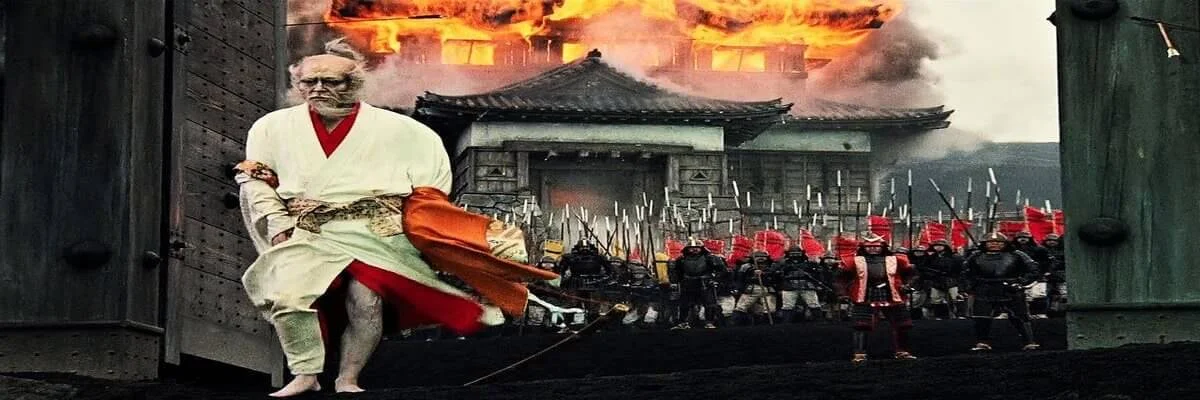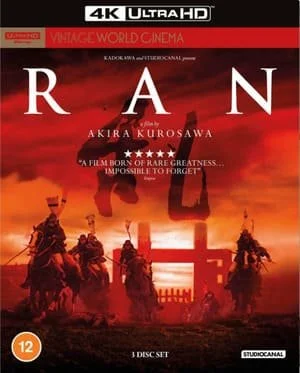
Ran 4K 1985 JAPANESE
Added: 19-07-2021, 14:00 in All 4K Movies / Drama 4K
Producer:
Akira Kurosawa
Cast:
Tatsuya Nakadai, Akira Terao, Jinpachi Nezu, Daisuke Ryû, Mieko Harada, Yoshiko Miyazaki, Hisashi Igawa, Pîtâ, Masayuki Yui, Kazuo Katô, Norio Matsui, Toshiya Ito, Kenji Kodama, Takashi Watanabe, Mansai Nomura, Takeshi Katô, Jun Tazaki, Hitoshi Ueki.
IMDB 8.2
File Size: 65.45 GB
Film Description
Japan, 16th century. The aging ruler of Hidetora announces the division of his possessions between his three sons.
Deceived by false assurances of loyalty to the two eldest sons of Hidetora, he drives away the younger, who dared to assert that his father's decision would bring death to their entire family. Having become a victim of an insidious betrayal, the ruler loses his mind, and a merciless fratricidal war begins between his heirs.
Deceived by false assurances of loyalty to the two eldest sons of Hidetora, he drives away the younger, who dared to assert that his father's decision would bring death to their entire family. Having become a victim of an insidious betrayal, the ruler loses his mind, and a merciless fratricidal war begins between his heirs.
Info Blu-ray
Video
Codec: HEVC / H.265 (42.4 Mb/s)
Resolution: Native 4K (2160p)
HDR: Dolby Vision, HDR10
Aspect ratio: 1.85:1
Original aspect ratio: 1.85:1
Resolution: Native 4K (2160p)
HDR: Dolby Vision, HDR10
Aspect ratio: 1.85:1
Original aspect ratio: 1.85:1
Audio
#Japanese: DTS-HD Master Audio 5.1
#Japanese: DTS-HD Master Audio 2.0
#Japanese: Dolby Digital 5.1
#English: DTS-HD Master Audio 5.1
#English: Dolby Digital 5.1
#French: DTS-HD Master Audio 5.1
#German: DTS-HD Master Audio 2.0
#Japanese: DTS-HD Master Audio 2.0
#Japanese: Dolby Digital 5.1
#English: DTS-HD Master Audio 5.1
#English: Dolby Digital 5.1
#French: DTS-HD Master Audio 5.1
#German: DTS-HD Master Audio 2.0
Subtitles
English, French, German.
Download
File size: 65.45 GB
Is Link Dead? Let us know and we'll replace the link. Report
We now have
Trailer Ran 4K 1985 JAPANESE
Related movies
Mulan 4K 2020
6-11-2020, 18:16
All 4K Movies / Adventure 4K
Legend of Eight Samurai 4K 1983 JAPANESE
26-10-2018, 13:13
Drama 4K
Nope 4K 2022 IMAX
27-10-2022, 14:21
All 4K Movies / Horror 4K
Batman and Superman: Battle of the Super Sons 4K 2022
17-10-2022, 14:16
Animation 4K
Mad Max Beyond Thunderdome 4K 1985
13-11-2021, 14:35
Adventure 4K
Shadow 4K 2018 CHINESE
23-05-2019, 18:26
Drama 4K
Comments (0)
Best UHD Movies
What kind of movie quality do you prefer?
